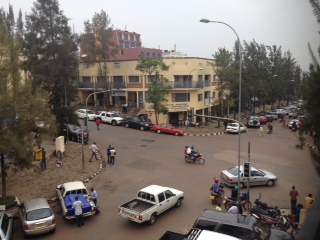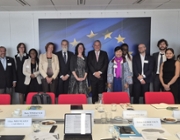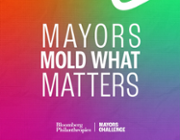Continuing campaign on sustainable urbanisation

27 April 2022
On the eve of the UN High-Level meeting with local and regional government representatives to review the New Urban Agenda, CLGF and partners held a webinar to continue the campaign for urgent action on rapid urbanisation and sustainable development.
The webinar was a collaboration of all the organisations responsible for the Call to Action on Sustainable Development, and the rationale for taking action was explained by a number of experts and stakeholders.
In his opening comments, CLGF Chairperson Rev Mpho MW Moruakgomo explained that The Call to Action on Sustainable Urbanisation across the Commonwealth was developed through an extensive consultative process by CLGF, the Commonwealth Association of Architects, the Commonwealth Association of Planners and the Association of Commonwealth Universities, with the support of the Prince’s Foundation and the Government of Rwanda. It responds to the challenges being faced across the Commonwealth and builds on the New Urban Agenda and the Agenda 2030 to propose actions using the Commonwealth network to support the achievement of sustainable urban development.
Critical moment
He called this a critical moment for reviewing progress towards implementing the New Urban Agenda (NUA), which sets an implementation framework for achieving sustainable development and said it was a sad reality that the starkest inequalities between our populations have increased in the last years. Rapid urbanisation, climate change and, more recently, COVID-19 have exacerbated existing trends in income and power disparities. He explained that cities and local governments, together with civil society organisations, have been on the frontline of delivering key services, often with very limited capacity and resources. "At the same time," he noted: "we have been reminded of the value of a multi-lateral approach, and the strengths of working together."
CLGF's Chairperson explained that The Call to Action seeks to put sustainable urbanisation more centrally on the Commonwealth Agenda and, most importantly, to call for greater focus on implementation, and how we can mobilise the Commonwealth network to work together to support more effective implementation.
He said: "We need cities and towns that work and can deliver for citizens. They are, and should remain, centres of opportunity and economic development, but for this to be inclusive it requires leadership and coordination at many different levels:
- enabling legislation that empowers cities to act;
- effective planning and community engagement;
- increased capacity and skills to deliver and manage the local impact of global challenges such as climate change; and, critically,
- access to adequate resources to be able to make a difference to the lives of all citizens."
CHOGM in June
There is huge potential in leveraging the power of the Commonwealth network to help achieve this, and this is the principle at the heart of the Call to Action. Without that multi-level and multi-sectoral approach that finds expression in the Agenda 2030 and the NUA as multi-level governance we will not be able to make sufficient progress.
We look towards the Commonwealth Heads of Government Meeting in Kigali in June.
UN Habitat support
Mr Neil Khor, speaking on behalf of UN Habitat Executive Director, Ms Maimunah Mohd Sharifmumina, said that urban and territorial development is at the heart of the Sustainable Development Goals (SDGs) and many of the targets. Urbanisation is unstoppable, but the Call to Action and initiatives of the Commonwealth partners were very impressive and speak to the potential for managing urbanisation and becoming a powerful tool of sustainable development. Accelerating the issue is critical in light of Covid and its global impact, but evidence-based guidance is needed to support any mitigation. Reiterating UN Habitat’s support for the Call to Action, he applauded the advocacy and ‘strength of togetherness’ and welcomed the discussions at the Commonwealth Heads of Government Meeting in Rwanda.
Representing the Government of Rwanda, Edward Kyazze said that urbanisation is a defining issue for Commonwealth cities, with so much growth forecast for Asia and Africa. As incoming Commonwealth Chair in office, the Rwanda Government has been actively involved with the call from the outset and looks forward to discussions at the Commonwealth Heads of Government Meeting CHOGM in June.
Moderating the discussion, CLGF Secretary-General Lucy slack welcomed input from a diverse panel.
Citizens at the centre
Lucy Stevens from Practical Action described some of the projects working with the world’s poorest, such as supporting waste pickers in Bangladesh and building toilets, applying and adapting methodologies to reduce flooding and contributing to climate and water resilience. She emphasised the importance of keeping citizens at the centre of call to action.
City dynanism
Marvin Rees, CLGF Board Member and Mayor of UK City, Bristol said that extensive international networks were essential to ensure a flow of finances through cities. The impact of rapid urbanisation is being felt now: air quality, homelessness, poverty and they cannot wait for national structures to facilitate improvements. Much of the dynamism can happen at city level, but this must be resourced and seen “not as a cost, but as an investment.” This will be good for skills development, social mobility, health and direct financial relationships to cities has to be part of the ‘how’.
Opportunity to unlock gains
Astrid Hass said the Commonwealth was well-placed to address the issues, and this could be an opportunity to support cities and unlock gains. Providing support directly to cities can help improve the municipal fiscal health that is needed to attract investment for infrastructure, service delivery but it is important to identify projects that truly reflect the wishes and needs of citizens, particularly taking into account the youth demographic. Important globally to use a multilevel approach as more green finance becomes available to cities.
Eris Schobergh from the University of the West Indies said there was much synergy between the Call to Action and what universities are doing. Universities can contribute through cluster research, using information from people on the ground about what’s going on in the region to inform research and strategies. Governments are moving to respond to coastal management, spatial land planning – but the response is largely from a policy perspective, with a gap between implementation. Rural communities, housing, the environment – universities can assist by providing scientific research, using evidence-based data.
Town planner Olafiyin Taiwo stressed the importance of including young people in the discussion, especially in a Commonwealth where 60% of the population is under 30. A youth network has been created as part of the Commonwealth Sustainable Cities Network, consisting of young professionals: public servants, academics, engineers, architects which will help to avoid the traditional silo approach to work. The network also recognises the value of inter-generational dialogue.
Collective financing
Shelly Narnia, Head of Bristol City’s International Unit, described the city’s vision of working on three levels. City level: in a convening capacity, working with all sectors to deliver. Bristol has a City Plan with 500 goals, which asks - what can your city do for you, and what can you do for your city. National level: working with other cities to look at collective financing, as this work cannot be done alone. International level: engaging with organisations and networks, like the CLGF, to impact on the global stage.
Lucy summarised the comments echoed by so many of the speakers, that in order to tackle the enormous challenge of rapid urbanisation and sustainable development, the following factors are needed:
- Listening to, and involving citizens in future strategies and planning
- Working in partnership with all sectors, collaboration not silos.
- Ensuring there is funding available to cities to implement plans
The challenges posed by urbanisation, climate change and working towards the SDGs are not going away, but highlighting these important factors at the next CHOGM will be key to taking the right steps forward.
Back to News





